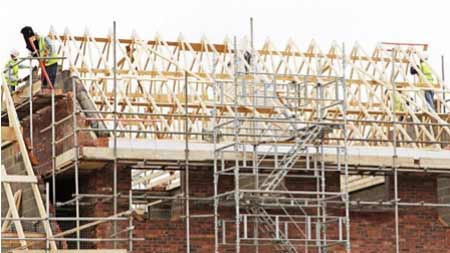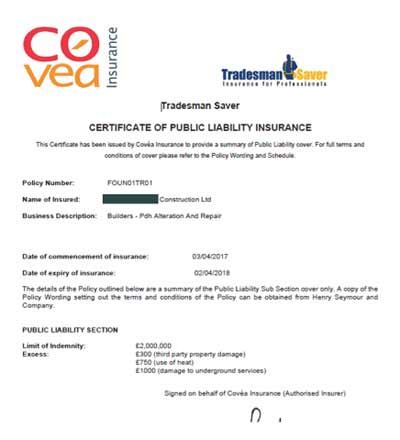Public liability insurance is an absolute must if you are in contact with the public in a working situation regularly. If you have an office of any kind, even if you work from home, or a showroom where members of the public are allowed you ought to have Public Liability Insurance in place. If your job takes you into, or onto, the property of the general public you should also think seriously about it too.
What is Public Liability Insurance?
If any member of the public is injured as a result of, or the injury is caused to them or their property by, a visit to, or by you to their home, you are liable for a claim against you for all costs, including legal costs.
In certain situations, where an accident results in personal injury which needs hospital treatment, the NHS (since 29th January 2007) can reclaim the cost of treating an injured patient. If that injured patient happens to be someone who got hit in the eye by a brick bouncing out of your skip, in their garden, it will cost you a great deal of money.
In October 2008 the NHS, assisted by the Compensation Recovery Unit collected a total of £13,510,691 following personal injuries and road traffic accidents. Yes, you did read that correctly, over 13 million pounds!
As you can imagine, particularly with legal costs included, these charges can mount up very quickly. With Public Liability Insurance all the cost are covered (up to the limit). Without it the builder or the homeowner where the work is being carried out will be liable.

Accidents happen – but Public Liability Insurance covers the cost and damages (image: C & A Mackie)
So what could happen if a claim is made and your builder (or you) does not have suitable public liability insurance? A claim needs to be brought against someone. It is most likely to be brought against your builder, but a builder that doesn’t have insurance probably doesn’t have much to lose (or he would have insured it!). So the building company will go bust or the builder will file for bankruptcy possibly before the (full) claim is met.
What then? If the accident happened on your property with building work commissioned by you, with builders chosen by you, it is conceivable that a claim would be brought against you. You are particularly attractive for brining a claim against being a home owner with assets to meet a claim.
This seems terrifying and punitive, because it was not your fault that the accident happened. After all, you probably were not even there when the accident happened, and it was a result of the ongoing building work that the builder was carrying out – he’s the expert builder here, not you. In fact, you do have responsibility as it is your property and you have employed people to work in it for you. You have to take responsibility!
These days every other advert on the television is about claiming money, on a no win no fee basis, for personal injury. The public are encouraged to claim for the slightest thing and there is the perception that some individuals make a living out of having accidents. Frustrating though spurious claims are, the system is actually pretty good a weeding them out.
Think about the genuine accident where an innocent third party is injured badly. They might need ongoing medical care and support, sometimes for the rest of their lives. This is expensive and someone needs to pay – it should not be them.
Their lives have been shattered enough. Accidents do happen; genuine accidents where it is bad luck and you or your builder did everything you could to prevent it – yet it still happened. It is reassuring to know that whoever (or whatever) is injured or damaged will be compensated, or at least enough to pay for the care that they might need for the rest of their lives.

Building work is inherently dangerous – Public Liability Insurance is a absolutely necessary
For the sake of a relatively inexpensive insurance premium, Public Liability Insurance is vital for builders. Building sites are by their nature inherently dangerous places. Hundreds and hundreds of accidents happen on site every year and one insignificant nail sticking out of a piece of waste timber can make you bankrupt if someone treads on it. The building game is risky enough, don’t take more chances than you need to.
Public Liability Insurance is not compulsory for Builders but we strongly advise every Builder to get it. We also advise all of the members of the general public who read this website not to employ builders who do not have it.
How Much Public Liability Insurance Should My Builder Have?
The cover you may need depends on the size and nature of your business. If you are a tunnelling organisation you will probably pay more than a carpenter but the Internet is full of companies who can quote for you whatever your circumstances. Most smaller businesses have cover of up to £2 million pounds.
This sounds a lot but imagine the worse case scenario of a gas explosion and the associated carnage and a couple of million pounds does not seem so much then.
The cover will be priced on the turnover of the business and also based on the type of work that they do. If your builder turns over more, the amount of cover and therefore the premium that he has to pay will be more.
The types of work that the builders are insured for will have an impact of the premium and the amount of cover needed; for example these will increase if the builder plans to undertake work on the roof, which is inherently more risky.
As business owners we know how much overheads cost. We are so aware of the hidden costs of paying wages and all of the bills. But whatever else you cut back on do not take the chance of losing your business for less than the price of a weekend away. Please!
As Homeowners, why would you potentially risk your home for the sake of insurance cover that any competent builder would have as a matter of course.
How to Check your Builders Public Liability Insurance?
All insurance will come with an insurance certificate. In this modern age these might not be printed out any more, but you should be able to get an email copy sent to you.
There are a number of things that you need to check on the certificate:
- Names: Check that it is for the builders that you have hired. The name of the insured will be clearly marked and this must be the same people or organisation that you have contracted with to do the work, and who have/will invoiced you. Get our free Desired Outcome Contract to protect you, your home and your builder here.
- Business Description: Check that they are insured to do the work that you are asking them to do. There will be short description of the works that they are insured for somewhere on the certificate; ensure that this is what you are asking them to do for you. It will be a very board description typically, but unless you’re after something particularly specialist it will probably cover what you want
- Check the date: Ensure that the certificate is in date. If you are having a lot of work done, then the insurance cover might expire during your project. Don’t worry about this, but ensure that you make a note to ensure that you check the new cover is in place before the old cover expires
- Check the Policy: Finally, call the insurance company to confirm that the certificate is valid. Here you can confirm with them that what you are planning to have the builder do is actually covered. If you have any other questions about the policy you can ask them too. It might be courteous to tell your builder that you are going to make this call

Example of a Builders Public Liability Insurance
Take a copy of the certificate for your own records. Most people simple take a photo with their phone now which saves photocopying, or get your builder to email you a copy.
You are probably pretty clear of the huge risk you are taking not having Public Liability Insurance, or employing a builder without it.
Other Insurance Considerations for a Building Project
While Public Liability Insurance is the most important one, especially from a builder’s perspective, there are a number of other insurances you may need to check or be aware of. It will depend on your project, who’s involved and how it is going to happen.
Here are some of the key things to check:
- Architects and Consultants: What about employing other professionals such as consultants on your project? They will be giving advice, but what if this advice is inadequate or inaccurate? There is insurance that covers this and any damage it could do, known as Professional Indemnity insurance, which should be held by anyone giving advice; check this, in the same way that you check your builders Public Liability Insurance, if you are taking advice
- Existing Building and Contents Insurance: You will have an existing policy that covers the building and probably the contents. Inform your insurance company about the work you are having done so that they can advise you about what is covered and what’s not. For example, if you move out for more than 30 days many covers become invalid
- Party Wall Insurance: This is extra cover that boosts the protection that you have on party walls, or walls that are shared with neighbours. These can be particularly contentious so extra cover specifically for issues, such as legal disputes, that might occur can be very helpful
- Building Contract: Make sure that you have a suitable contract in place for your building work. If there is a dispute this is what you will fall back on. That said, we have found by going through the process of putting a contract in place most of the points of dispute have been addressed so the dispute seldom happens. You can download our Desired Outcome Contract here for free
You home is your most valuable asset, so there is a fair amount of effort that is required to maintain and protect it. This is especially the case when you are having building work done. Make sure that you have sufficient insurance, particularly Public Liability Insurance.

